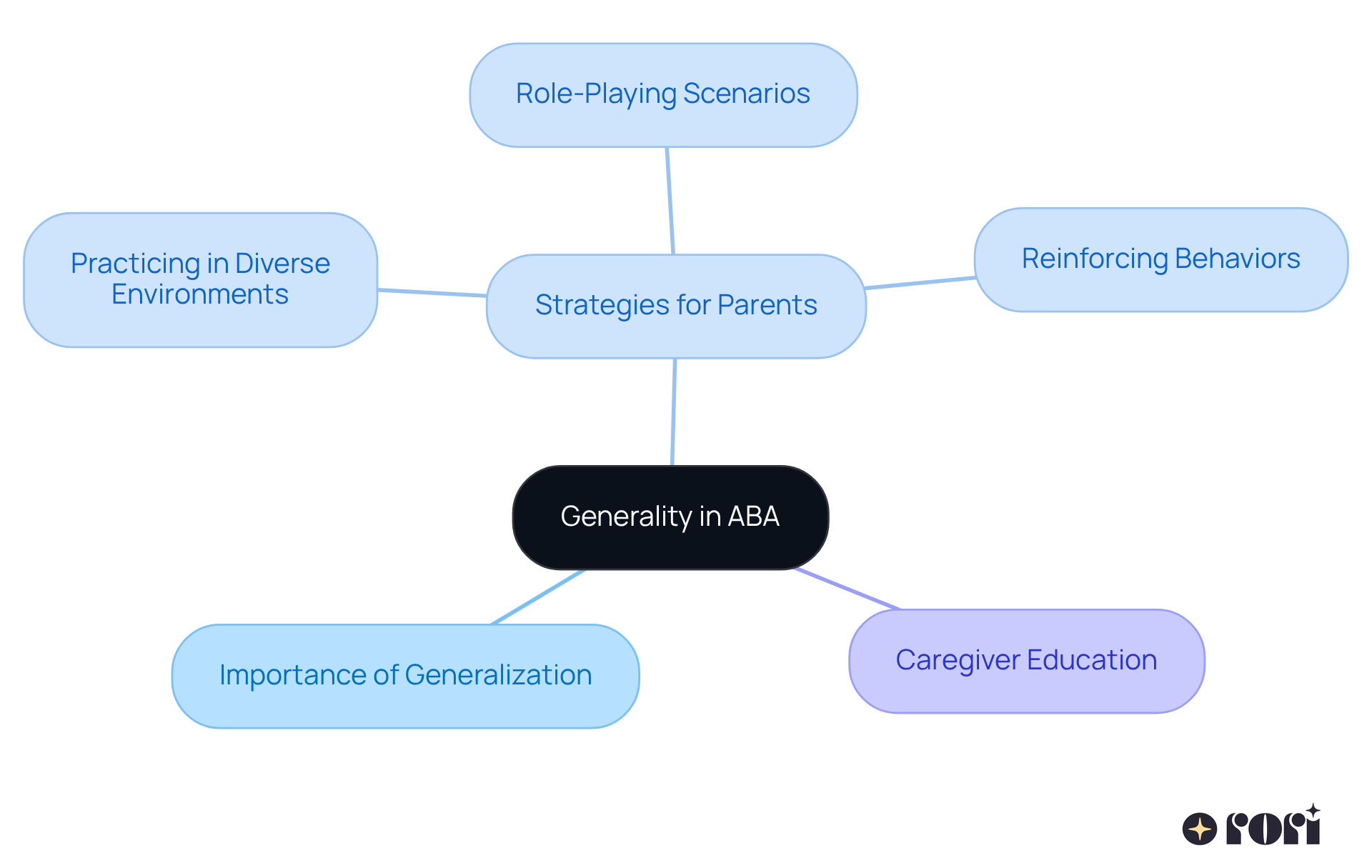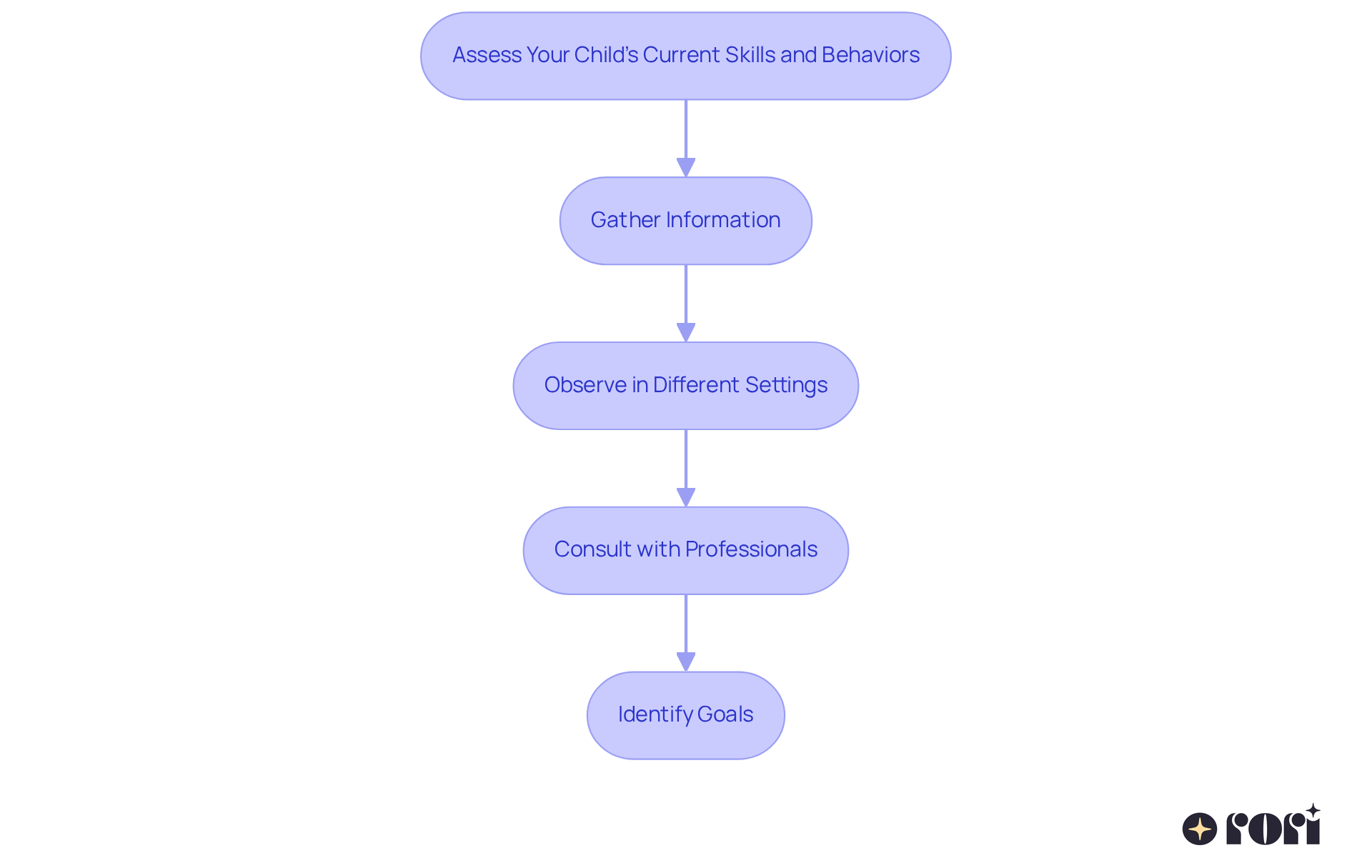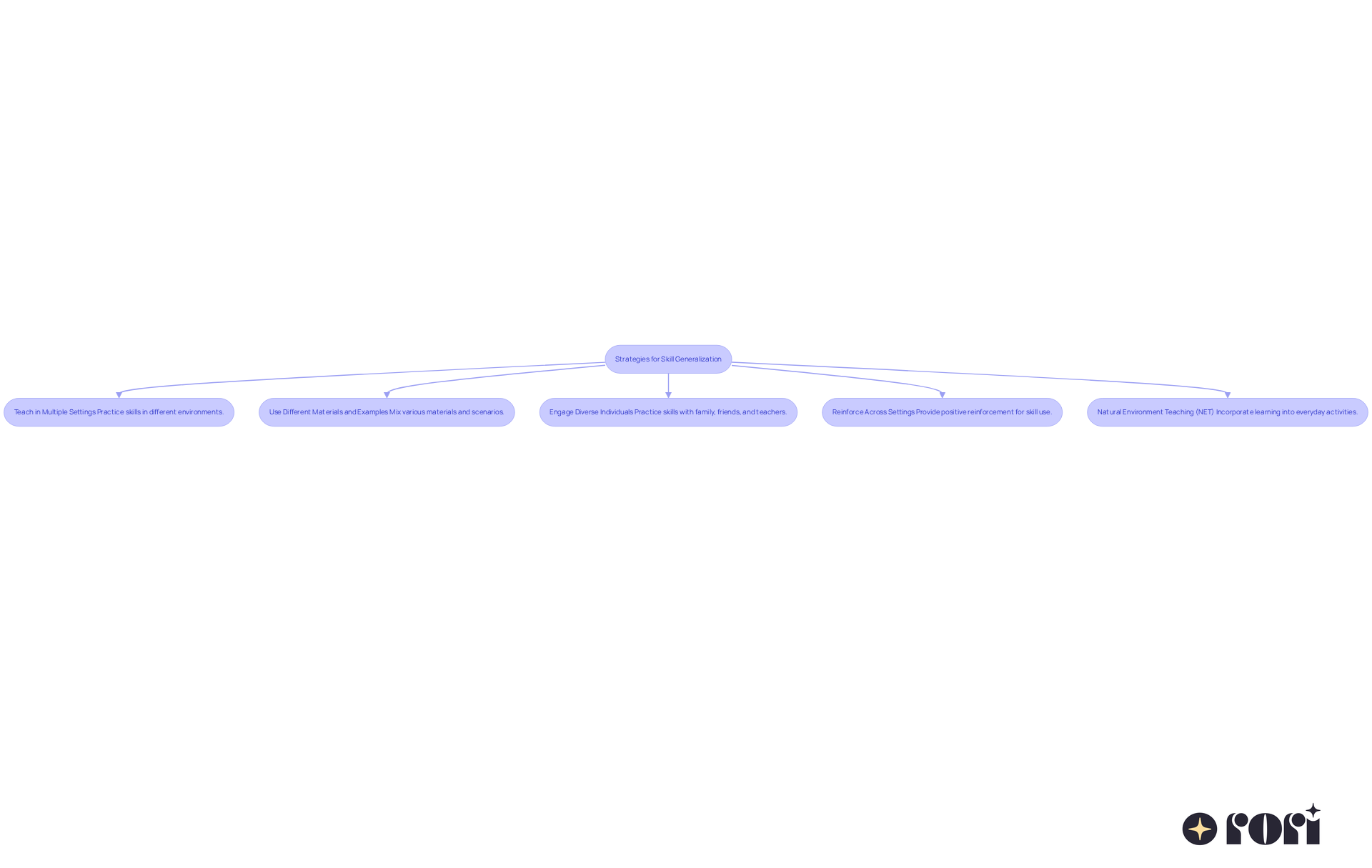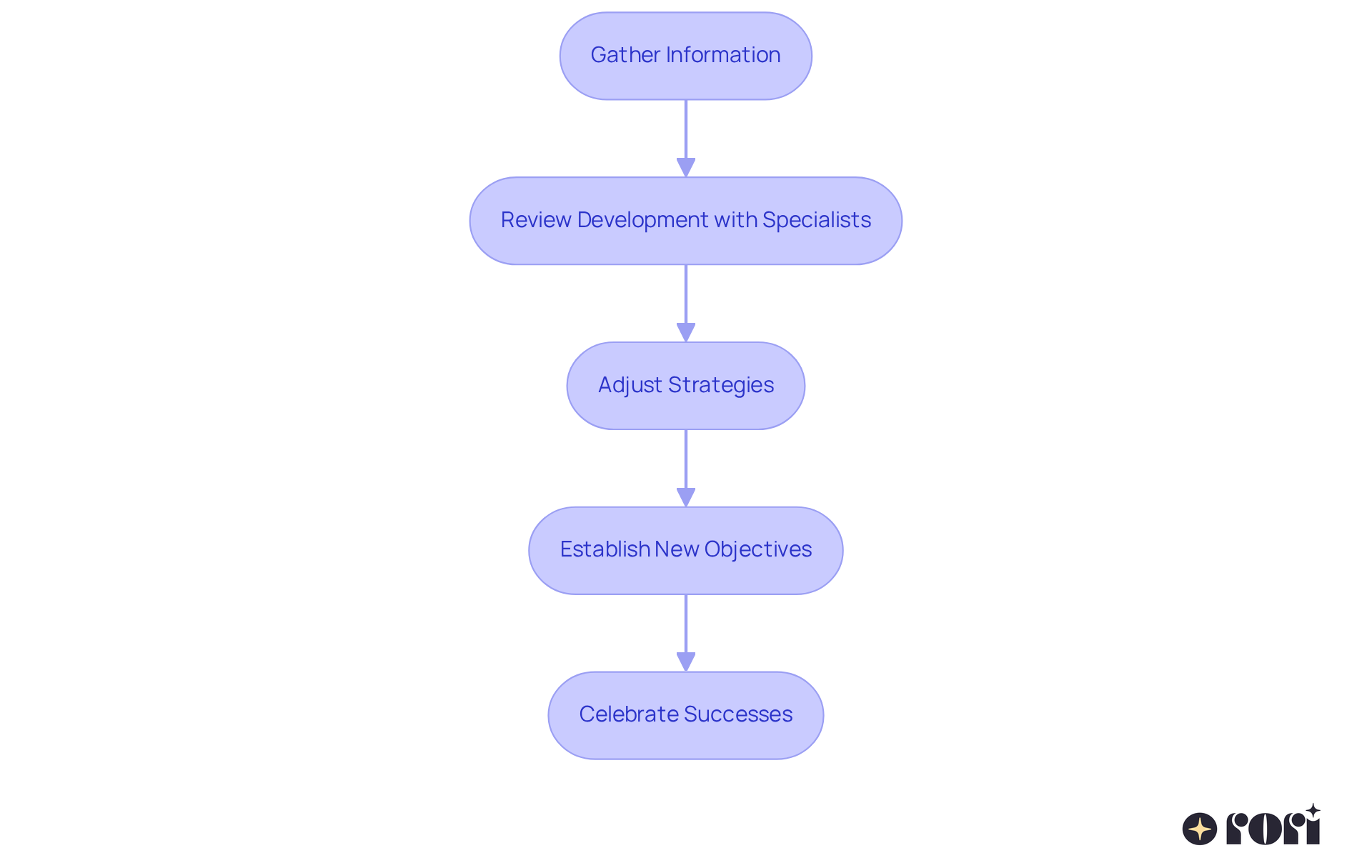This article dives into how parents can truly master the concept of generality in Applied Behavior Analysis (ABA) to boost their child's learning and behavioral skills in different settings. By grasping the idea of generalization, trying out various practice strategies, and keeping an eye on progress, parents can play a vital role in helping their child transfer skills learned in therapy to real-life situations. This not only nurtures greater independence but also enhances adaptability. Let’s explore this together!
Understanding how children can transfer learned skills from therapy to real-life situations is so important in the world of Applied Behavior Analysis (ABA). This guide is here to offer parents some essential strategies to help their child’s development shine, ensuring that positive behaviors extend beyond therapy sessions.
But you might wonder, how can caregivers effectively assess their child's current abilities and implement techniques that promote skill application in different environments? Let’s explore these critical aspects together! Doing so will empower you to enhance your child's independence and adaptability, ultimately enriching family dynamics and overall well-being.
We’re here to help you every step of the way!
Understanding the concept of generality in ABA is crucial for parents. It involves a child’s ability to use learned skills in various settings, with different people, and over time. This means that the positive behaviors your child develops during therapy should reach beyond the therapy room and into everyday life. For instance, if your child learns to greet others in sessions, generalization ensures they can also greet family members, classmates at school, and even strangers when out and about. The ultimate goal of ABA therapy is to nurture independence and adaptability in various environments.
To effectively support generality in ABA, it's important for parents to understand the seven dimensions of ABA, with generalization being one of the most vital. This dimension emphasizes the generality in ABA, indicating that skills should not only be learned but also maintained and applied in different contexts. You can help your child’s learning journey by:
By recognizing how important generalization is, you can advocate for strategies that promote skill transfer in real-life situations.
Moreover, caregiver education is key in this process. When caregivers are equipped with a deeper understanding of ABA principles and strategies, they can make informed choices that positively impact their child’s progress. Actively participating and aligning with therapeutic strategies often leads to better behavioral outcomes, empowering caregivers to support their children confidently and improve overall family dynamics. Importantly, ABA therapy is patient-centered, adapting to each individual’s unique needs to ensure effective treatment.
Let’s explore this together! By embracing these strategies and insights, you’re taking an important step in your child’s development. We’re here to help you every step of the way!

To effectively encourage the generality in ABA therapy, parents should start by evaluating their child's current abilities and behaviors. This assessment can be done through various methods, like direct observation, standardized assessments, and feedback from therapists. Let’s break it down:
Gather Information: Collect data on your child's skills across important areas such as communication, social interactions, and daily living skills. Tools like the Verbal Behavior Milestones Assessment and Placement Program (VB-MAPP) and the Assessment of Basic Language and Learning Skills (ABLLS-R) can give you a comprehensive overview. Gathering data during therapy sessions is essential for tracking progress and understanding your child's development. At Rori Care, our behavior care engine tailors treatment plans based on this performance report data, ensuring that interventions are customized to your child's evolving needs.
Observe in Different Settings: Keep an eye on your child's interactions in various environments, including home, school, and community settings. Note where they shine and where they face challenges, as this will help inform targeted interventions tailored to their individual needs. Active caregiver participation is crucial—significant progress is noted in 90% of children when suggested hours are fully executed.
Consult with Professionals: Team up with your child's ABA therapist or BCBA to gain insights into their development and identify areas needing improvement. These professionals regularly review progress and adjust goals, providing valuable assessments and tailored recommendations based on their expertise. At Rori Care, our dedicated clinicians are here to guide your family's journey through compassionate ABA treatment.
Identify Goals: Based on your assessment findings, pinpoint specific abilities that need generalization. For example, if your child can request items during therapy but struggles to do so at home, this should be a key target for achieving generality in ABA efforts.
By thoroughly evaluating your child's abilities, you can gain a clear understanding of their strengths and areas for growth, laying the groundwork for effective generalization strategies. Remember, ABA therapy is recognized as an evidence-based best practice treatment, ensuring that the methods used are grounded in scientific research. Empowering caregivers with ABA principles will further support your loved one's behavioral goals through knowledge, strategy alignment, and data collection. Let’s explore this journey together!

Once you've had a chance to evaluate your child's abilities, the next step is to explore strategies that encourage generality in aba. This is particularly important for kids who may be facing behavioral challenges or skill gaps, like those with Autism Spectrum Disorders or ADHD. Let's dive into some effective techniques that can make a difference:
By actively using these strategies, you can significantly boost your child's ability to show generality in aba, leading to greater independence and success in many areas of life. This approach is rooted in the principles of Applied Behavior Analysis (ABA), which highlights the generality in aba by tailoring to each child's unique needs, empowering you to provide effective behavioral support. Let’s explore this together and see how these techniques can help your family thrive!

Tracking your child's development is a vital part of nurturing their growth in ABA. Here’s how you can effectively keep track of their progress and make necessary adjustments:
Gather Information: Regularly collect information on your child's performance as they use their acquired skills in different settings. This can include counting how often they use certain behaviors, how long they last, and making qualitative observations. Our behavior care engine updates intervention and skill acquisition plans after each session based on what’s been achieved, ensuring that treatment plans stay flexible and responsive to your child's needs.
Review Development with Specialists: Set up regular meetings with your child's ABA therapist or BCBA to review data and discuss their progress. They can share insights into what’s working and what might need tweaking. With automatic data collection, our clinical team is always there for your little one without disrupting the session, making it easy to review progress. Plus, all data is securely stored, anonymized, and deleted after analysis, so your child’s information stays safe.
Adjust Strategies: Based on what you gather, be ready to tweak your strategies. If something isn’t working, don’t hesitate to experiment with different techniques or environments. Being actively involved in your child's therapy not only enhances their learning but also empowers you as a caregiver to make informed decisions.
Establish New Objectives: As your child progresses, set new goals that encourage them to apply their skills more broadly. For instance, if they can ask for help at home, encourage them to do so in public places. This ongoing goal-setting is essential for early intensive behavioral intervention (EIBI) to boost learning, verbal, and social skills.
Celebrate Successes: Celebrate your child's achievements, no matter how small! This positive reinforcement encourages continued effort and engagement, creating a nurturing environment for your child’s development.
By consistently keeping an eye on progress and being adaptable in your approach, you can help your child develop their skills effectively and achieve generality in ABA, all while being supported by the principles of ABA and your active involvement. Let’s explore this journey together!

Understanding and promoting generality in Applied Behavior Analysis (ABA) is so important for helping your child apply learned skills in various settings and situations. This process not only boosts your child's independence but also ensures that the positive behaviors nurtured during therapy carry over into everyday life, leading to more holistic development.
Throughout this article, we’ve highlighted key strategies to support this vital aspect of ABA. From assessing your child's current skills and behaviors to implementing diverse teaching methods and monitoring progress, each step plays a crucial role in facilitating skill generalization. Plus, the importance of caregiver involvement and education can’t be overstated—engaged parents can significantly impact their child's success in applying learned behaviors outside the therapy environment.
Ultimately, promoting generality in ABA is a collaborative journey that requires commitment and adaptability. By actively engaging in the strategies we’ve discussed, you can empower your child to thrive in various contexts. Remember, the skills learned in therapy are meant to be a part of everyday life! Embracing this approach not only benefits your child but also enriches family dynamics, paving the way for a brighter future filled with opportunities for growth and success. Let’s explore this together!
What is the concept of generality in ABA?
The concept of generality in ABA refers to a child's ability to use learned skills in various settings, with different people, and over time. It ensures that positive behaviors developed during therapy extend beyond the therapy room into everyday life.
Why is generalization important in ABA therapy?
Generalization is important because it helps children maintain and apply learned skills in different contexts, promoting independence and adaptability in various environments.
How can parents support generalization in their child's learning?
Parents can support generalization by practicing skills in diverse environments, using role-playing scenarios, and consistently reinforcing positive behaviors across different settings.
What are the seven dimensions of ABA?
The article emphasizes the importance of understanding the seven dimensions of ABA, with generalization being one of the most vital dimensions, focusing on the transfer and maintenance of learned skills.
How does caregiver education impact a child's progress in ABA therapy?
Caregiver education is key because when caregivers understand ABA principles and strategies, they can make informed choices that positively affect their child's progress and outcomes.
What is the goal of ABA therapy?
The ultimate goal of ABA therapy is to nurture independence and adaptability in children, enabling them to apply learned skills in various real-life situations.
How does ABA therapy cater to individual needs?
ABA therapy is patient-centered, meaning it adapts to each individual's unique needs to ensure effective treatment tailored to the child's specific circumstances.